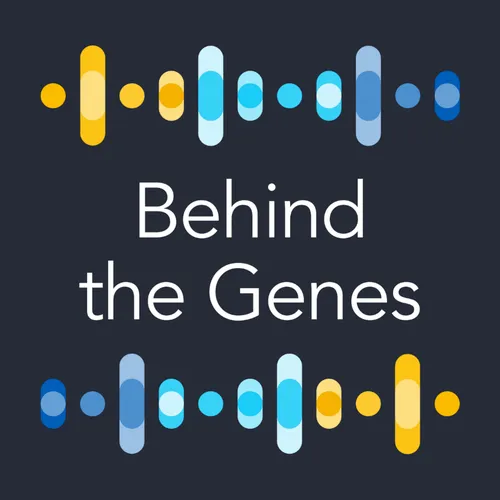
Behind the Genes
We’re talking about all things genomics, with guest speakers from across the genomics ecosystem.
- Update frequency
- every 9 days
- Average duration
- 30 minutes
- Episodes
- 102
- Years Active
- 2022 - 2025

Öznur Özkurt, Mathilde Leblond, Rebecca Middleton and Sandra Igwe: How has design research shaped the Generation Study?
The Generation Study is a research initiative aiming to explore the use of whole genome sequencing in newborns, to screen for more than 200 rare genetic conditions. This study will recruit 100,000 ba…

Amanda Pichini: Which healthcare professionals are involved in my genomic healthcare journey?
In this explainer episode, we’ve asked Amanda Pichini, Clinical Director at Genomics England and Genetic Counsellor, to explain which healthcare professionals you may come into contact with in your g…

Maili Raven-Adams, Niharika Batra, Trupti Patel and Naimah Callachand: How can we ensure equitable access to genomic medicine?
Digital consent models, language barriers, and cultural differences are just a few factors that can exclude people from participating in genomic research. In this episode, our guests discuss these is…

Natasha Gordon-Douglas, Oleander Agbetu, Jayson Kupoluyi and Marie Nugent: How can organisations support those living with sickle cell?
For Sickle Cell Awareness Month, our sickle cell Patient Voice Group discuss their lived experiences with sickle cell, shedding light on how organisations need to be considerate when engaging with pa…

Aman Ali, Anna Smith, Moestak Hussein and Naimah Callachand: How can we bridge the gap between diverse communities?
In this episode of Behind the Genes, we explore the challenges diverse communities face in accessing genomic medicine. The discussion focuses on issues including language barriers, cultural differenc…

Vivienne Parry, Professor Bill Newman, Anita Hanson and Professor Matt Brown: Can genomic testing prevent adverse drug reactions?
Pharmacogenomics plays a critical role in personalised medicine, as some adverse drug reactions are genetically determined. Adverse drugs reactions (ADRs) account for 6.5% of hospital admissions in t…

Sarah Wynn, Emma Baple, Lindsay Pearse and Naimah Callachand: How has a groundbreaking genomic discovery impacted thousands worldwide?
In this episode, we delve into the impact of the new groundbreaking research uncovering the RNU4-2 genetic variant linked to neurodevelopmental conditions. The discovery, made possible through whole …

Dr Rich Scott and Helen White: How can we work in partnership towards a new era of genomic medicine and research?
Genomics has changed considerably over the past 10 years, and we are now exploring how to integrate it into routine healthcare. In this episode, our guests reflect on this evolution and discuss how t…

James Duboff: Genomics 101 - How do pharmaceutical companies use genomic data for drug discovery?
In this explainer episode, we’ve asked James Duboff, Strategic Partnerships Director at Genomics England, to explain how genomic data can be used in drug discovery.
You can also find a series of shor…

Professor Sir Jonathan Montgomery, Dr Latha Chandramouli and Dr Natalie Banner: Why do we need to consider ethics in genomic healthcare and research?
Ethical considerations are essential in genomic medicine and clinical practice. In this episode, our guests dive into the details of ethical principles, highlighting how they can be brought into prac…

Professor Matt Brown: Genomics 101 - What is personalised medicine?
In this explainer episode, we’ve asked Professor Matt Brown, Chief Scientific Officer at Genomics England, to explain what personalised medicine is and how it could change the way we treat genetic co…

Will Navaie: Genomics 101 - What is 'ethics'?
In this explainer episode, we’ve asked Will Navaie, Head of Ethics Operations at Genomics England, to explain what ethics is and why it's important, in the context of genomics.
You can also find a se…

Marie Nugent: Genomics 101 - Why is diversity important in genomics research?
In this explainer episode, we’ve asked Marie Nugent, Community Manager for the Diverse Data Initiative at Genomics England, to explain what diversity is and why it's important, in the context of geno…

Ellen Thomas: Genomics 101 - What is genetic or genomic testing?
In this explainer episode, we’ve asked Ellen Thomas, Interim Chief Medical Officer at Genomics England, to explain what genetic and genomic tests are, why someone might do a test, and how they are pe…

Shaun Pye, Sarah Crawford, Sarah Wynn and Naimah Callachand: Shining a light on rare conditions
Joey was diagnosed with DYRK1A syndrome at the age of 13, through the 100,000 Genomes Project. DYRK1A syndrome is a rare chromosomal disorder, caused by changes in the DYRK1A gene which causes a degr…

Clare Kennedy: Genomics 101 - What is the difference between DNA and RNA?
In this explainer episode, we’ve asked Clare Kennedy, Clinical Bioinformatician at Genomics England, to explain what the difference is between DNA and RNA, in less than 10 minutes.
You can also find …

Lisa Beaton, Dr Celine Lewis, Jana Gurasashvili and Louise Fish: Hope for those with "no primary findings"
There are a range of outcomes from a genomic test. The results might provide a diagnosis, there may be a variant of uncertain significance, where a genetic variant is likely the cause of the conditio…

Helen Brittain: Genomics 101 - What is a variant of uncertain significance?
In this explainer episode, we’ve asked Helen Brittain, Clinical Lead for Rare Disease Diagnostics at Genomics England, to explain what a variant of uncertain significance is, in less than 10 minutes.
…
Julia Vitarello, Rich Scott and Ana Lisa Tavares: Treating Mila - Lessons for those living with rare conditions
29 February marks Rare Disease Day. This day is an opportunity for the rare community to come together to raise awareness of the common issues affecting those living with rare conditions. A rare cond…

David Bick: Genomics 101 - What is the Generation Study?
In this explainer episode, we’ve asked David Bick, Principal Clinician for the Newborn Genomes Programme at Genomics England, to explain more about the Generation Study, in less than 10 minutes.
For …